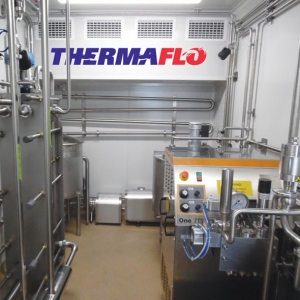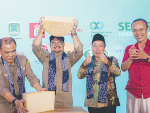A New Zealand company has invented a containerised dairy processing plant that will be operational in Indonesia within two months.
The 40-feet container plant that Thermaflo manufactured for the Indonesian company contains a fully hygienic, process plant that will separate, homogenise and pasteurise 1500L of raw milk per hour. Using a four-head inline filler the company will also be able to bottle fresh milk and cream.
Themaflo says with the unique container plant will operate at the highest international standards and produce a top quality product.
Thermaflo have been working for 10 years to establish its brand within the Indonesian market.
“With a number of smaller jobs previously completed it didn’t take long to establish a reputation as manufacturers of high quality processing equipment; this reputation is what helped land a project to design and manufacture a containerised milk process plant for a well-known pineapple processor,” it says.
The Indonesian company first got in touch with Thermaflo in early 2013 as it looked for a great way to make its business not only greener but to also develop a new dairy based business. With the infrastructure purchased the company contacted Thermaflo for processing equipment. Thermaflo provided a unique concept that was cost effective and provide for expansion of the operation in the future.
From the signing of the purchase order, it took the Thermaflo team one month to design the process flows and to make sure all the equipment would fit inside the container. Over the following four months, Thermaflo fabricators built the process from the ground up, this includes the Sureshield flooring and poly panel walls, to the installation of the homogeniser, pasteuriser, separator and all the pipe work to connect each piece of processing machinery. In addition to the process plant that is housed within the container, services are also housed outside, such as the hot water boiler and air conditioning. These will be shipped with a 20” refrigerated container that will be used to stock the finished product.
Once the fabrication was completed at Thermaflo’s premises their team commissioned the container plant at the workshop so it was ready for export.
Making cream
Product is pumped from the raw product tank housed outside into the level controlled pasteuriser balance tank. From here product is pumped through the regenerative section of the plate heat exchanger (PHE) by a centrifugal pump to the separator. From the separator, the cream is separated and sent to the batch pasteuriser for thermal treatment, and the remaining skim milk is then homogenised.
Using the screw valve on the separator it is possible to manually standardise the product to contain a certain percentage of cream. A skilled plant operator would be required, and still the fat level may vary by 1-2% due to a fluctuation in the total solids in the milk being processed.
Once the cream is separated, the milk is then sent through the HTST pasteuriser. The pasteuriser heats the raw product to between 73-80Co, for 15 seconds. This temperature profile is not the norm for New Zealand or Australian milk processing, but is very common in an Indonesian plant. Once the milk has been heat treated, it is then sent back through the heat regenerative section of the pasteuriser and then through the cooling section to exit at 4 oC or lower. Once this process is complete the milk is then ready to be bottled through the inline filler.











